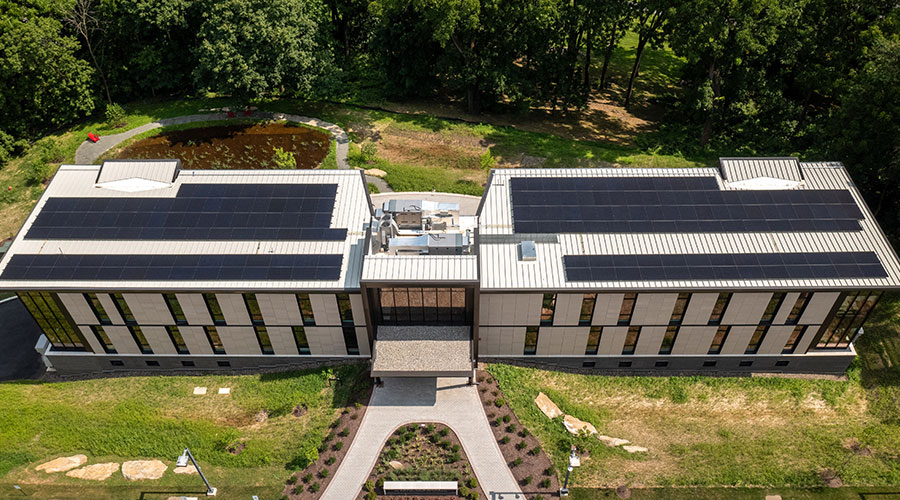10 Tips for Selecting a Roofing Contractor
From financial history to licensing and insurance, make sure to check the boxes on all these criteria for getting what you want from a roofing contractor.
OTHER PARTS OF THIS ARTICLEPt. 1: This Page
A new roof system is a big expense — it is one of the largest exterior building components — and it is also one of the few building elements that is primarily built on-site and reliant on proper application for long-term success. The roof system is constructed of a number of separate components — deck, insulation, membrane, and flashings — that must interact with total synchronicity. Improper application of any of the components within the system contributes to premature failure. For this reason, the selection of the contractor is critical to the service life success of the system. Here are 10 factors to consider to help vet and choose the right contractor for your roofing situation.
1. Actual Cost
Cost is often the determining factor in choosing a contractor for a project. It remains one of the top considerations in the roof purchase process. In the traditional process a number of contractors are solicited to provide bid estimates for the completion of the work. In this scenario, the awarded contractor is selected based on lowest price. This format is often used in public bids — state, local, or federal government projects — where the rules stipulate that low bidder must be awarded the project unless there is cause to disqualify the bid.
The drawbacks to the process are inequality of bidders, inequality of materials and systems bid, and the reality that the low-bidder may have made a mistake in the bid process that could ultimately jeopardize the quality of the work. If the contractor made a mistake in the bid, the firm may try to cut corners so that it does not lose money on the job. In that scenario, the contractors’ mistake will end up costing the building owner and facility manager in the long run.
As a best practice, the only time that price should be the ultimate consideration is when you have equally qualified contractors bidding on the same materials, system, and application procedures. You should also qualify the low contractors’ price to ensure that they did not miss anything in the bid process.
2. Pre-qualify
If you are selecting contractors based largely on cost, it’ll be important to pre-qualify the contractors prior to the bid process. This ensures that all contractors are equally qualified to complete the project. The bidding contractors should be equal in professionalism, experience, and workmanship. The requirements for pre-qualification are provided below.
3. Scope of work
There is a plethora of roof materials and systems available on the low-slope commercial market. There are also different application methods — recover or replacement — that will have an impact on the cost of the project. It is best to provide a scope of work (preferably design specifications) that provides materials, systems, and application methods so that the contractors are all bidding equally.
If a scope of work cannot be provided, make certain that the contractors’ estimates include a detailed scope of work that provides materials, systems, and application procedures. The goal is to compare apples to apples.
Have the contractor provide a proposed schedule with the bid estimate that includes estimated start time and estimated project duration. The schedule may become a top consideration if the low-bidder cannot start the project based on your needs.
4. Financial strength
Have the contractor provide the company’s financial records for a time period acceptable to you (typically three to five years). Ensure that the contractor is financially stable and that it has the proper financial resources to complete your project. Financial strength becomes more important as the duration of the project increases. If a contractor cannot complete the project it will be nearly impossible to hire another contractor to complete the project. A new contractor will likely not assume risk or take responsibility for any work that it did not do. A manufacturer may also not provide a warranty based on these circumstances.
The contractor should provide a financial list of references that includes its main suppliers — material manufacturers, equipment companies, disposal service, and distributors. The suppliers that they deal with on a regular basis can provide the best analysis of their true financial strength.
5. Experience and history
Experience is an important factor. Well-established companies can provide some assurance of professionalism based on the conception that they would not be in business if they did not provide quality workmanship. It is important to establish that the company has the history that it indicates in its marketing materials. For instance, has the ownership and management been consistent or was the company recently sold to a new owner? This may impact how the company currently does business. Make certain that the company has operated under the same name and tax identification number. Also, ensure that there have been no filings of bankruptcy or delinquent taxes in its history.
6. Service record
There was a time when roofing contractors had worse service records than cable providers. Competition, the economy, and renewed professionalism in the industry have changed that perception. Most roofing companies have separate service departments that fix leaks and make minor repairs and conduct maintenance on completed roof areas. This is an important criterion to look for in a contractor, particularly if a warranty is provided. All of the manufacturers require that the owner conduct annual maintenance to the roof system to keep the warranty valid. It is beneficial to the owner if the company maintaining and repairing the roof after completion is the actual installer because that company has a vested interest in its long-term performance.
During the bid process, obtain the contractors’ service rates and response time once a leak is reported. It should be immediately or at the least within 24 hours.
7. Track record
All contractors should provide references of projects that were successful. It is important to contact these references to ensure that they were satisfied with the contractor’s work. It is more important find out how the contractor responded when problems occurred on the project. This is construction, and problems are likely to occur. It is best to contact the roofing manufacturers that the contractor is certified with to provide insight on how they responded on the “problem” projects that they typically do not list as project references.
You may also contact your state’s Better Business Bureau or Department of Professional Regulation to see if there have been any complaints against the contractor.
8. Safety record
Safety training and on-site job safety have become the most important aspects for all trades on all construction projects. Due to the nature of the work, safety is especially important on roof projects. Ensure that the contractor has an established safety training program and that all on-site roof mechanics are properly trained. Most construction projects also require that a safety talk be completed daily, prior to the work day, to review all safety requirements. The contractor’s safety procedures may be required by your insurance company or your organization’s management.
9. Insurance coverage
Have the contractor provide a current Certificate of Insurance. Make sure that the insurance coverage is in compliance with your requirements and the requirements of the state where the facility is located. Ensure that the insurance coverage is in effect throughout the duration of the project.
The important coverages to review are general liability and workman’s compensation. The contractor should have coverage required in case of damage to the building, the landscape, and interior contents. This is heavy construction and damage may occur. Workman’s compensation rates should be in compliance with your local state’s requirements. Check with your state for the current requirements.
10. Licensing and certification
Ensure that the contractor is properly licensed to complete work in the state where the facility is located. Make certain that the license is up to date. Many states require that contractors complete annual training to maintain the license. You can find this information through your state’s department of professional regulation or licensing board.
Also, have the contractor provide a list of all roofing manufacturers’ materials and systems that they are certified to install. Most manufacturers require that the contractors complete special training and have extensive experience installing the products prior to issuing a certification. They will also complete extensive due diligence into the contractors finances, experience, and quality of work prior to providing certifications.
Final bid phase: pre-construction meeting
The final phase in the bid process will be the pre-construction meeting. Most owners will not award the contract until the successful conclusion of the pre-construction meeting. This meeting is important to define the project requirements and establish the lines of communication between you and the contractor. The contractor should have its project manager, superintendent, and foreman at the meeting. Discussions should include project schedule, set-up areas for material and equipment, working hours, interior protection, plans to work in occupied areas, and contact information for personnel when there is a problem.
Following these tips can help you in your quest for a quality roof system that is completed at a fair price by a professional roofing contractor.
John D’Annunzio, president of Paragon Consultants and Paragon Roofing Technology, Inc., has more than 20 years experience as a consultant on projects around the world. D’Annunzio, a construction consultant specializing in roofing and waterproofing materials application and field performance, has written four books about roofing. He can be reached at john_paragon@ameritech.net.
Email comments and questions to edward.sullivan@tradepress.com.
Related Topics:












